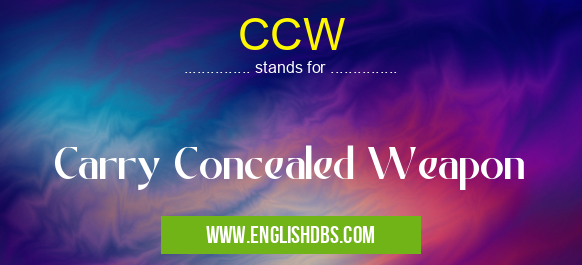What does CCW mean in MILITARY
Carry Concealed Weapon (CCW) is an acronym that refers to carrying a weapon in a concealed or hidden manner. This practice is gaining more and more traction around the globe as individuals are seeking to protect themselves and their property from criminal activity. In many countries, CCW is also a legal process whereby citizens who qualify can obtain permits to carry a gun for self-defense.

CCW meaning in Military in Governmental
CCW mostly used in an acronym Military in Category Governmental that means Carry Concealed Weapon
Shorthand: CCW,
Full Form: Carry Concealed Weapon
For more information of "Carry Concealed Weapon", see the section below.
» Governmental » Military
Governmental Regulation
The regulation of CCW differs widely depending on the jurisdiction and region in which it takes place. In some countries, such as the United States, individual states have their own laws governing CCW permitting which may include requirements such as background checks, training courses, proficiency tests, and more. Meanwhile, other countries may prohibit any type of concealed carry outside of law enforcement officers and military personnel.
Benefits & Risks of CCW
The primary benefit of CCW is that it provides additional protection against those who would do us harm. Knowing that we are armed with a defensive weapon makes us feel safer in our environment and gives us assurance that we can defend ourselves if an unfortunate situation arises. However, this increased feeling of safety also comes with risks including accidental discharge, misuse by others due to lax security measures, and the potential for misuse by those with malicious intent. It is important for anyone considering carrying a weapon in this manner to understand these risks before doing so.
Essential Questions and Answers on Carry Concealed Weapon in "GOVERNMENTAL»MILITARY"
What is a Carry Concealed Weapon (CCW) permit?
A CCW permit grants individuals in certain states the ability to carry concealed firearms in public places. It requires an application, background check, and fee to be approved.
Who is eligible for a CCW permit?
Eligibility requirements vary state-by-state, but typically require applicants to be at least 21 years old, a legal resident of the U.S., and pass a background check. Most states also require applicants to complete training courses before being granted a permit.
Can I obtain a CCW permit if I don't live in the same state where I apply?
Depending on the state laws, some out-of-state residents are allowed to obtain CCW permits, while others may not be eligible. Contact your local law enforcement or governing body for more information on eligibility requirements for your state.
What type of firearms can I carry with my CCW permit?
The types of firearms you can carry under your CCW permit will depend on the regulations set by your state or jurisdiction. Be sure to double check with local law enforcement prior to purchasing any firearms or ammunition as part of your permit application process.
How long does it take to get a CCW permit?
The length of time for processing depends on whether you have completed all necessary paperwork and passed the required background checks and tests. In most cases, it usually takes two months or less from start to finish.
Is there an additional fee associated with my CCW permit?
Fees range depending on where you live and whether you need additional training courses or classes involved in the process of obtaining a CCW permit. Some states charge an initial fee for submitting applications or have renewal fees that must be paid periodically.
Do I need any special qualifications to obtain a CCW Permit?
Generally speaking, no special qualifications are needed other than meeting the age and residency requirements mentioned above as well as passing any applicable background checks and training courses related to owning/using firearms responsibly.
Will my employer know if I obtain a CCW Permit?
Unless otherwise stated by law enforcement or privacy policies set by your employer, they would likely not know about your application for - nor granting - of the permit itself unless you inform them yourself.
Final Words:
In conclusion, Carry Concealed Weapon (CCW) is an option available to individuals looking for increased protection from criminal activity or other threats posed by people who mean harm. While there are benefits associated with carrying a concealed weapon, there are also risks that must be taken into consideration before deciding whether or not this form of self-protection is right for you. Ultimately it’s up to the individual to decide what measures they deem necessary for personal safety and security – just be sure to follow any applicable laws related to your region when doing so!
CCW also stands for: |
|
| All stands for CCW |
